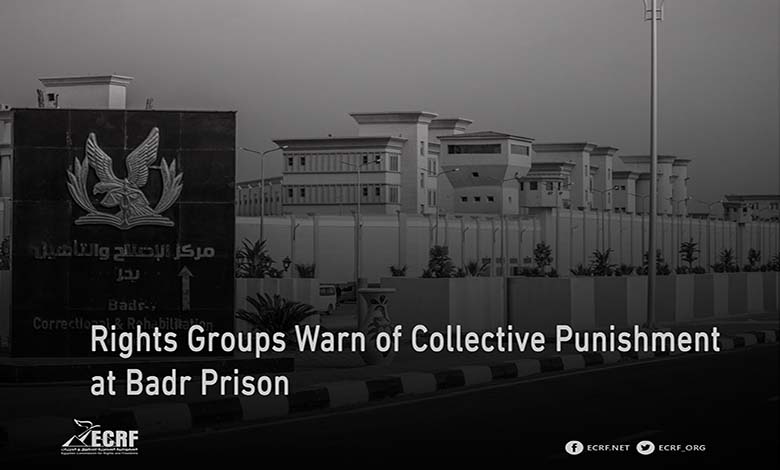We, the undersigned Egyptian and international organizations, express our deepest concern regarding the egregious and collective violations of human rights taking place at Egypt’s Badr Rehabilitation and Correctional Center. We are particularly alarmed by recent reports of numerous suicide attempts and hunger strikes among detainees due to the nature and scale of abuses taking place. These reports have not been yet corroborated due to the lack of transparency and the authorities’ refusal to allow independent access to prisons, as well as their denial of visitation rights to family members. We call on the international community—Egypt’s influential allies, the United Nations, and other members of international civil society—to demand transparency in Egypt’s prisons system. We reiterate our demand that the Egyptian government grants unrestricted access to the International Committee of the Red Cross (ICRC) and independent human rights groups to prisons in Egypt; allows independent investigations into allegations of wrongdoing; and holds perpetrators of abuse accountable for their crimes.
Since the transfer of prisoners into Badr began in June 2022, at least four deaths have been reported. In at least three of these cases, authorities have failed to respond to calls for medical assistance. Our organizations have documented other forms of abuse that amount to torture. These vary from maintaining bright lights in cells 24 hours a day to chaining prisoners to the walls of their cells without food and water for days at a time. Prisoners have reported receiving electric shocks if they make requests for improved conditions. Prison cells are monitored with cameras 24 hours a day. ّIn October 2022, Omar Mohamed Ali, a prisoner, was subjected to sexual harassment by prison security personnel after being transferred to Badr prison.
Visitation rights are granted arbitrarily and enforcing them is effectively up to the discretion of security officials. In some cases, prisoners have been denied visitations for years on end, and prison authorities continue to deny medications and personal belongings sent by family members to inmates. Prisoners face court hearings online from within the prison, where they are not granted physical access to the court and free access to their lawyers. From February 20 till March 8, renewal of detention hearings for Badr 3 prisoners held in pretrial detention have not been convened under the pretext of a technical malfunction in the screens. Similarly, on March 7 and 8, renewal of detention hearings for Badr 1 prisoners have been postponed, leaving a total of 918 individuals imprisoned without their pretrial detention being renewed by a court.
Despite the Egyptian government’s many claims of reform, including its promotion of Badr as a new, modern prison, these abuses persist unabated and with impunity. The prosecutor’s office has repeatedly failed to seriously investigate allegations of abuse and torture, including incidents resulting in the death of detainees. In November 2022, during a renewal of detention court hearing where detainees were only allowed to join online, the judge disconnected the detainees from the call when they began expressing their grievances about the violations being committed against them. During another hearing on March 13, prisoners informed the court of the torture and other violations committed against them at Badr 3 prison, the judge however denied lawyers’ request to put the prisoners’ statements on a separate record and open an investigation into their complaints.
We note that reports of treatment in the prisons varies, with a few prisoners granted more access to visits and reporting temporarily improved conditions, while dozens of others report significant deterioration in conditions and access to the outside world. These conditions have led to a sense of hopelessness among inmates, resulting in the reported suicide attempts and hunger strikes.
We reiterate calls for:
- A human rights monitoring mechanism at the UN Human Rights Council, which may be tasked with investigating and reporting on these abuses;
- Greater transparency into the prison system and for the Egyptian authorities to allow independent and international access, including to the ICRC, for visits to all parts of the prison;
- A repeal of decree 8901/2021 by the minister of justice, which allows for detention renewal court hearings to take place without detainees’ physical presence in the court;
- The enforcement of prison regulations concerning prisoners’ visitation rights and repealing COVID-19 related restrictions on these rights, which have been in place since August 2020.
Signatories
- Cairo Institute for Human Rights Studies (CIHRS)
- Freedom Initiative
- ACAT-France
- Arab Media Freedom- Monitor
- Association for Freedom of Thought and Expression (AFTE)
- CAFAGB
- Cairo Institute for Human Rights Studies (CIHRS)
- Centro de Estudios Legales y Sociales – CELS
- Citizens International
- CIVICUS
- Committee for Justice
- CRAN – Carrefour de Réflexion et d’Action contre le Racisme anti-Noir en Suisse
- Egyptian Commission for Rights and Freedoms
- Egyptian Front for Human Rights (EFHR)
- Egyptian Human Rights Forum
- EgyptWide for Human Rights
- El Nadim Center
- El Shehab for Human Rights
- Freedom House
- HEDA Resource Centre
- HuMENA for Human Rights and Civic Engagement
- International |Service for Human Rights (ISHR)
- International Federation for Human Rights
- JCA-NET(Japan)
- Jewar
- MENA Rights Group
- Omani Human Rights Association
- Project on Middle East Democracy (POMED)
- Syrian Center for Media and Freedom of Expression (SCM)
- The Key (Palestine)
- The US Committee to End Political Repression in Egypt
- TheirRight
- Till the Last Prisoner Campaign
- Unidosc, Mexico
- We Record
- West African Human Rights Defenders’ Network
- WHRDMENA Coalition
- World Organisation Against Torture (OMCT)

